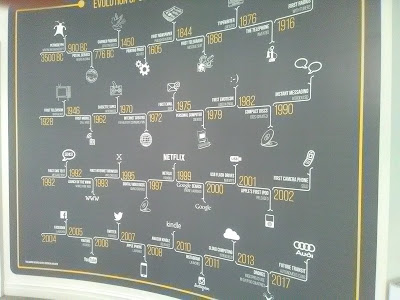EOTO: The Telegraph
History of the Telegraph
In the 15th century, the printing press played a key role in communication, but it couldn't provide instant communication from person-to-person. Later, in the early 1800s, the telegraph started as an idea to send signals across wires in order to communicate from one place to another. The significance of the telegraph and how it facilitated communication became a globally recognized development that provided an instant communication from major cities across the world.
In 1832, Samuel Morse began developing a version of the telegraph and 3 years later in 1835, he created a code known as "Morse Code". This code was used as communication and consisted of a set of dots and dashes that was assigned to each letter of the alphabet. These dots and dashes could then be translated into messages. He presented the telegraph to the U.S. Congress in 1838 however, he was not the first person to think of the idea. By this time, over 60 people have claimed to have invented the first telegraph, yet Samuel Morse was the first person to get political backing for his telegraph. Prior to the telegraph, the printing press took days, weeks, and even months to send messages. Now, messages can be transmitted within minutes. The first message sent through the telegraph was on May 24, 1844 and read "What hath God wrought".
Western Union was the top telegraphic company in 1864 and it operated on 44,000 miles of wires and was values at $10 million. The growth was substantial and within ten years that comapany's value grew by 11,000 percent. In 1866 it was operating on 100,000 miles of wire with a value at $40 million.
Impact of the Telegraph
The telegraph revolutionized long-distance communication. "After the telegraph cable was stretched from coast to coast in the 1850s, a message from London to New York could be send in mere minutes, and the world suddenly became much smaller." The telegraph evolved and benefited businesses and politics as well as relationships with other countries. This new possibility of transmitting information quickly over long distances, furthered the growth of railroads, created the foundation of economic expansions, and would even help establish peace between national rivalries. Abraham Lincoln used the telegraph during the Civil War in order to issue commands and direct movements in nearly real time, this ultimately helped the north win.
The telegraph impacted the growth that was taking place during the Industrial Revolution and allowed information to be sent from business to business. The telegraph was also a fairly inexpensive source to communicate internationally. Development of the telegraph paved the way for the invention of the telephone. Alexander Graham Bell worked in attempts to improve the telegraph which resulted in the success of the telephone innovation. The telegraph was one of the first major influences that is important on the technological timeline of communication development and created a new anticipation of what the future holds.





No comments:
Post a Comment